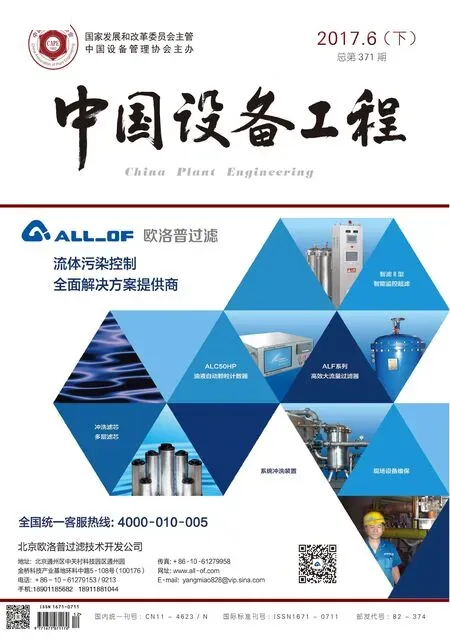某機組ETS系統DCS系統一體化改造
魏東
(鄭州裕中能源有限責任公司,河南 鄭州 452375)
某機組ETS系統DCS系統一體化改造
魏東
(鄭州裕中能源有限責任公司,河南 鄭州 452375)
針對某廠1號機組ETS系統設備老化,可靠性低以及系統本身無歷史追憶等情況,對ETS系統DCS系統一體化進行可行性研究,選用由主機DCS廠家生產的硬邏輯實現汽機保護ETS-V系統,利用機組停機檢修機會對ETS系統進行改造,結合改造對三重冗余LPC模件的ETS系統進行說明,取消單點保護,所有保護信號采用冗余配置,對改造后的ETS系統進行各項性能測試和各工況試驗。結果表明,ETS系統可靠性和穩定性大大提高,和主機DCS實現無縫銜接, ETS系統DCS系統一體化得到成功應用。
ETS系統;LPC;一體化;DCS;試驗
1 概述
某火電廠1號機組汽輪機保護系統,采用OMRON-200 PLC結合繼電器回路搭建跳機回路。汽輪機保護動作信號通過硬接線輸入至PLC,經過邏輯運算后控制接觸器,由接觸器觸點驅動AST電磁閥和跳機電磁閥,同時通過硬接線向DCS系統的SOE卡件輸送汽機跳閘信號。該系統自1994年投產以來設備服役時間已長達16年,經多年運行,部分設備元器件已經老化,直接威脅機組安全運行,而且系統本身沒有歷史趨勢記錄和事故跳閘順序記錄功能,不便于進行機組跳閘后的事故分析。
2 ETS系統納入DCS系統可行性研究
通過對國內同類型機組ETS系統DCS一體化改造后運行情況的調研,以及1號機DCS系統廠家新華控制工程有限公司技術人員進行探討,若采用傳統DCS系統的軟邏輯實現,就不可避免地對ETS系統抗保護拒動和誤動的能力帶來一定的影響:DCS系統通訊中斷、卡件故障、主機死機等異常,可能導致汽輪機緊急跳閘保護功能的拒動和誤動問題。
針對DCS系統可能發生的故障,決定采用三重冗余LPC模件的ETS結構。該結構主要由3塊LPC模件組成。每塊LPC模件通過預制專用電纜接受同樣的跳機信號,分別進行邏輯判斷,同時輸出跳機信號。這3路跳機信號在ETS邏輯板上實現“3選2”邏輯判斷,當超過2塊LPC模件輸出跳機信號時,才發出跳機信號,既避免了設備誤動又解決了設備拒動,每塊LPC模件均能獨立完成遮斷機組的功能。LPC模件動作速度快,可靠性高,LPC模件的執行周期<5ms,在出現緊急情況下,立即停止汽輪機運行,保證機組的安全。同時LPC模件還具有順序事件記錄功能,時間分辨率<1ms,便于查找故障和分析問題。
3 ETS系統DCS系統一體化實施
本次ETS改造硬件配置了兩個機柜,一個為模件柜,另一個為端子柜,采用兩臺UCSA控制器,分別通過聯入DCS冗余實時星形網中。ETS模件柜主要包括UCSA控制器、BCNET通訊模件、LPC卡、IO卡件、電源組件、網絡組件。端子柜主要包括LPC端子板、ETS2to3組件、DI/DO端子板,繼電器組件等。同時BCNET通訊模件的串口與GPS系統實時通訊,使進入LPC端子板的開關量信號會打上時間標簽,這些信號通過DCS網絡進入SOE系統。當信號發生變化時,SOE系統會生成事件報表,方便熱工技術人員快速、準確查找跳機原因。
(1) 輸入信號處理。1號機組所有保護信號均采用相互獨立的一次測量元件和輸入通道引入,對所有保護信號進行“二選二”、“三選二”或者“兩或一與”邏輯判斷,取消單點保護,提高熱工保護配置的可靠性。在保護邏輯處理方面,每塊LPC卡邏輯相同且相互獨立。 只有每組LPC卡保護輸出通過ETS模件處理后保護才能真正輸出,即同一組的任意兩塊LPC保護輸出,汽輪機保護才能動作。某一塊LPC模件故障不會引起汽機誤跳,并且其它模件的運行能保證汽機在有跳閘條件時跳閘,并不影響機組的保護功能。同時SOE系統會自動生成事件報表,ETS系統給出跳機首出信號。
(2) 輸出信號處理。1號機ETS系統輸出方面配置了兩塊ETS2/3邏輯運算模件,其運算原理如圖3,該模件為硬邏輯運算模件。每塊ETS2/3模件同時接受A、B兩組LPC模件保護輸出信號,F6模件控制AST1/ATS3電磁閥,F7模件控制AST2/AST4電磁閥,F6和F7模件保護輸出相或控制停機電磁閥,發15S脈沖信號。兩塊ETS2/3模件配置,即使其中一塊模件故障,也能保證汽輪機保護系統不拒動和誤動。此外F6和F7模件接收DEH系統AST電磁閥試驗信號,能保證各AST電磁閥能夠獨立試驗而又不影響機組的安全運行。在停機電磁閥控制回路中增加操作臺手動按鈕停機的硬操回路如圖1,在機組ETS系統完全失靈故障時,動作停機電磁閥,保證機組安全。
(3)ETS系統電源。①ETS控制柜電源。采用兩套完全獨立的電源:大UPS和小UPS對ETS控制柜供電,兩路電源同時接入電源切換箱,經電源箱切換向后對控制器和5V 和24V電源模塊供電,卡件電源5V和24V全部冗余配置,提高電源的可靠性。②遮斷裝置電源。AST電磁閥采用兩路110VAC供電,AST1/3電磁閥使用一路電源,AST2/4電磁閥使用另一路電源,停機、復位電磁閥采用直流220VDC電源,與AST電磁閥電源分開,這樣既防止110VAC電源發生故障,造成保護誤動、汽輪機跳閘,同時也防止直流電源故障時,無法停機,提高ETS系統的可靠性,以上電源均有失電報警。
(4)ETS系統與DCS系統通訊。ETS系統配置兩臺UCSA控制器,通過專用線纜納入1號機組DCS系統,實現ETS和DCS系統實時通訊,ETS系統控制器只是對三重冗余結構保護回路進行邏輯再現,其邏輯運算不參與保護判斷,只是對保護信號進行SOE采集、保護首出判斷以及對護信號進行網絡傳播和共享。

圖1 保護系統出口邏輯圖
4 ETS系統可靠性及試驗
改造完成后,我們做了以下試驗項目,對ETS系統的安全性和可靠性進行測試,測試結果符合設計要求。
(1)I/O通道檢測。所有輸入/輸出通道的源頭加信號,并測試信號是否正常。
(2)電源冗余測試。控制模件柜電源和模件電源均配置互為冗余的兩路電源,停一路電源,機柜的通訊模件和控制主模件及子模件正常運行,實現無擾切換,同時光字牌發出ETS模件柜電源失電報警。
(3)通訊模件冗余測試。復位通訊模件BCNET主模件,BCNET備用模件自動投入使用,機柜控制主模件和子模件正常運行,實現無擾切換,同時DCS系統報警光字牌發出該通訊模件故障報警。
(4)SOE測試。使用連續信號發生器,模擬ETS系統保護動作信號,SOE事件記錄準確,精確到1ms。
(5)模件柜和跳閘回路失電試驗。汽機已掛閘的條件下,停掉ETS模件柜的兩路交流或直流供電電源,然后再送電,ETS系統不跳閘,光字牌發出ETS模件柜失電報警。
(6)I/O子模件故障模擬試驗。在汽機已掛閘的條件下,拔掉其中一塊LPC或ETS2/3邏輯運算模件,ETS系統不跳閘,模擬有跳閘信號(如手動停機按鈕)的情況下不影響ETS系統跳閘,同時DCS畫面報警光字牌和滾動條報警窗發出該模件故障報警。
(7)控制器UCSA故障模擬試驗。在汽機已掛閘的條件下,DPU19/ DPU119任停其中一個或全部停運控制器, ETS系統不跳閘,同時在有跳閘保護信號時不影響ETS系統正常跳閘,同時DCS系統發出DPU脫網報警,不影響ETS系統首出功能。
(8)ETS系統邏輯動態試驗。1號機組汽輪機掛閘后,進行保護動作實際試驗ETS系統動作均正常。
5 結語
1號機組ETS系統各項試驗圓滿完成,說明1號機組ETS系統改造是成功的,ETS系統采用三重冗余LPC模件結構,大大提高ETS系統的穩定性和可靠性,同時大大降低了控制設備引起的保護誤動和拒動,既保證了ETS系統的獨立性,又完美納入了DCS系統,實現ETS系統DCS系統一體化。
[1]熱工控制系統及設備.中國電力出版社,2009.12.331-333.
[2]OC6000e系統ETS說明書.新華控制工程有限公司.
TK263
A
1671-0711(2017)06(下)-0133-02

